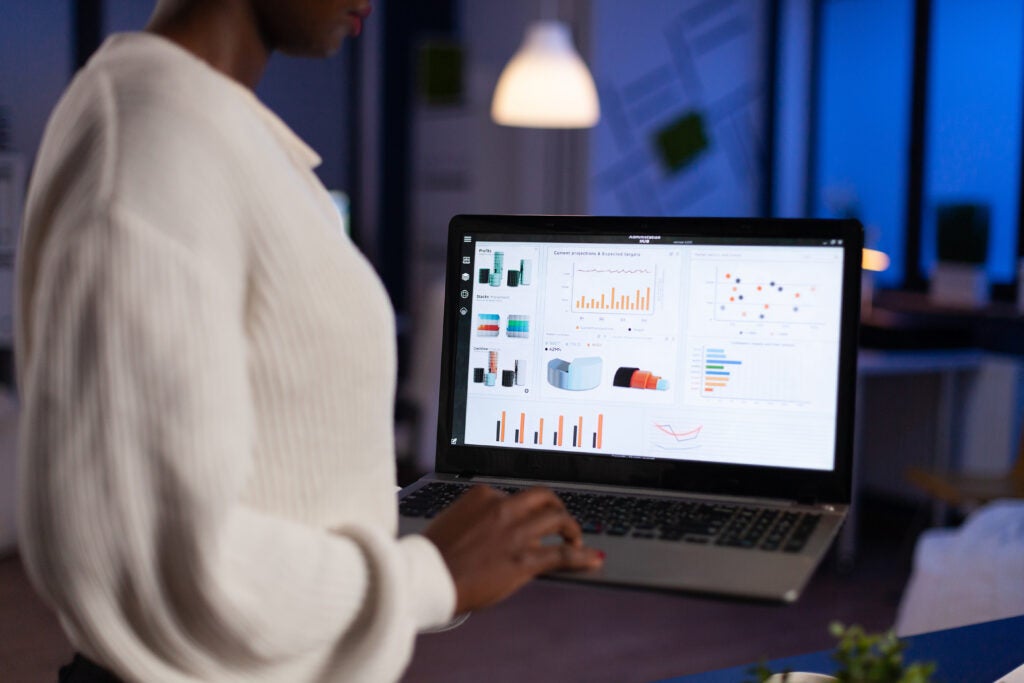Broadly speaking, influencer marketing means using someone who is influential — i.e., someone who can drive others’ purchasing behaviors — in a particular niche to market your product.
This practice has really taken off on Instagram in recent years in the form of lifestyle influencers selling B2C merchandise like makeup and clothing, but it’s gaining more steam in the B2B space as well.
Learn more about how B2B influencer marketing is different and what it takes to succeed in this guide.
What Is B2B Influencer Marketing?
Influencer marketing has been around for decades in the form of sponsorships and endorsements from both celebrities and more niche industry leaders. In B2B, influencer marketing takes on a different form that has proven to be incredibly powerful for B2C and B2B brands alike, allowing it to become a top trend that businesses are implementing in 2022.
Influencer marketing works because it harnesses the power of another individual’s following. In many cases, these influencers take months or years to build up their expertise, reputation, and followers, working for little to no pay until they finally get enough recognition to secure legitimate sponsorships and go full-time as an influencer.
Tapping into the right B2B influencers can supercharge your brand’s marketing efforts and make a huge payoff in the long run, but you have to approach it the right way.
Differences Between B2C and B2B Influencer Marketing
When getting started with B2B influencers, be aware that your experience may differ from working with B2C influencers. If you already have experience working with B2C influencers in other industries, then you’ll need to update your marketing playbook to make it work for the B2B world.
Budget and Timeline
First of all, B2B influencers may require a larger budget than B2C, which is typical for B2B marketing in general. Projects also require a longer lead team in terms of both planning and payoff. This is because B2B purchase decisions usually involve a longer timeline and more steps than a spur-of-the-moment B2C buy.
B2B purchasing decisions usually involve consuming content across a variety of mediums. In other words, the influencer content will be one interaction point on the way to a sale, instead of a single interaction point that spurs a purchasing decision.
This means that the B2B influencer campaign needs to be designed in conjunction with all of your other marketing materials to tell a cohesive story that will nudge your intended audience toward their final purchasing decisions.
Platform and Outreach
As for marketing channels, B2B influencer marketing may use different platforms than you are used to seeing associated with B2C influencers. For instance, B2B influencers are more likely to utilize blogs and YouTube videos in addition to Instagram, TikTok, and other popular B2C influencer platforms.
You will also need to be more proactive about doing B2B influencer outreach. While influencers targeting B2C brands tend to be the ones asking brands for collaborations, B2B influencers aren’t known for putting themselves out there as much.
Thought Leader vs. Influencer
In fact, B2B influencers may not always call themselves influencers. They are more likely to call themselves “thought leaders” and other similar terms. So, big name thought leaders such as Neil Patel and Gary Vaynerchuk qualify as B2B influencers.
Conflicts of Interest
On a final and more practical note, conflicts of interest are much more common in the B2B world than the B2C world, so companies need to be aware of this when reaching out to the B2B influencers they want to work with.
They should do a little preemptive research to see if the B2B influencer already has business interests or contracts that would prohibit a future collaboration due to conflicts of interest.
Tips for Getting Started With B2B Influencer Marketing
Research Influencer Content
When getting started with B2B influencer marketing, begin by seeing who is creating influential content in your industry. Follow the thought leaders that make content related to your business and see what kind of influencer marketing campaigns they are already putting out.
Don’t forget to check out your competitor’s influencer content to inspire your own and also make sure that you don’t do anything that is too close to their existing campaigns.
Choose Influencers Based on Engagement
When seeking out influencers to potentially partner with, don’t only pay attention to follower count; see what engagement each potential influencer has in terms of likes, comments, etc.
Pay special attention to nano- and micro-influencers. They may have small followings now, but those followers are often superfans who are very engaged, so these influencers often have a big ROI relative to their pricing. Try searching influencer marketing platforms to find influencers who are actively looking to work with brands.
Develop an Influencer Marketing Strategy
Once you find some influencers that you might want to partner with, figure out where influencer content fits into your marketing mix and how you can use your other channels to leverage the influencer content, such as by cross-sharing on your social media platforms.
Video content will continue to remain big in 2022, so brainstorm ways that influencer content and video content can intersect in your marketing to have an even greater effect.
Let the Influencer Play a Role in Content Development
As you plan out influencer content, focus on ongoing partnerships instead of one-off posts, since B2B purchasing decisions require more touches. You should also let the influencer play a role in the content development. If you’re dictating all the creative decisions top down, could you consider creating the content in-house?
Set Goals and Metrics
Finally, choose what goal(s) you want to accomplish with your influencer marketing campaign and figure out what metrics you will use to measure that success. The more influencer content you put out, the more data you will have, and the further you can refine your future marketing campaigns to achieve the best results.
Moving Forward in B2B Influencer Marketing
Having the right marketing software will make it much easier to plan, execute, and launch successful marketing campaigns, whether they involve influencers or not. Looking for more marketing tools to add to your toolbox? Browse our marketing software guide or connect with one of our unbiased experts for a free technology consultation.





